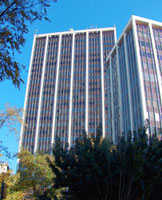
[Updated Oct 2020] A guide to flexible serviced offices and office space to rent in Athens as well as general information that may be useful if you are thinking of renting offices or workspace in the city.
For further offices information or to search office space for rent in Athens just click. Or contact us for any other query.
History & Geography
As the birthplace of democracy and the cradle of western civilization Athens is both a modern European city and a historical icon. The Greek capital lies sprawled over the plain of Attica on the Mediterranean and is surrounded by the four large mountains of Aegaleo, Parnitha, Penteli and Hymettus. Athens, which derives its name from the goddess Athena, has been inhabited for the last 7,000 years. It was around 1400 BCE that it became a major fortified settlement of the Mycenaean civilization. By the 6th century BCE Athens had become a major naval power and together with Sparta defeated the Persians, ending Persian rule over the Ionian cities of Cyprus, Aeolis, Doris and Caria. This heralded what has been called the Golden Age of Athenian democracy. During this time Sophocles, Euripides, Socrates, Hippocrates and Herodotus lived in Athens and the city built the Acropolis and the Parthenon. After the Peloponnesian War against Sparta, however, Athens went into a long decline, it recovered briefly in the 9th and 10th centuries, but after being invaded by the Ottoman Empire in 1453 it continued to decline. After the Greek War of Independence in the early 19th century, Athens was named the new capital of Greece and was extensively expanded and modernised. In 1896 the city hosted the first modern Olympic Games. The population of Athens continued to grow, swelled by Greek refugees from the Greco-Turkish War in the 1920s, but it was only after WWII that the city experienced a population boom. In the 1980s the city was beset by the problems of overcrowding and chronic pollution. However, the city took anti-pollution measures and expanded and improved its infrastructure. In 2004 Athens hosted the Olympic Games once again and in doing so cemented its continuing legacy as one of Europe’s most dynamic, historical yet ever-changing cities.
Economy
Since the beginning of the 20th century, Athens has been the most important mercantile hub in the region. It is by far the most important manufacturing city in Greece and accounts for half of all industrial jobs in the country. Earnings are generally much higher in Athens than the rest of Greece and unemployment figures much lower. Exports from the city include olive oil, tomato products, wine, cement and bauxite. Shipping is also a major industry in Athens, centred on its port of Piraeus. Piraeus handles over 20 million tons of cargo every year and is one of the largest seaports in the Mediterranean. The port employs almost 2,000 people in Athens and serves over 24,000 ships every year. As well a cargo ships Piraeus also serves passenger liners and is the largest passenger port in Europe. The other staple of the Athenian economy is of course tourism, which brings in over 16 million visitors to the country every year – most of whom pass through Athens. While Athens has many of the ingredients for a thriving economy it has been hamstrung for decades by the same problem – corruption, of both the political and economic variety.
Greek financial crisis
In 2010 the Greek government debt became unsustainable and the country asked the IMF for a bailout package, which was granted to the tune of EUR 45 billion. Greece’s credit rating was reduced to junk status and the country adopted a series of unpopular austerity measures including the raising of EUR 50 billion by denationalising companies, and increasing taxes for anyone with an annual income of over EUR 8,000, an increase in VAT, an extra tax of two percent to combat unemployment and an increase in tax on pensioners. These measures were unpopular and lead to widespread rioting, strikes and unrest. The social effects of the austerity measures have been serious and have even led to Greeks turning to NGOs for healthcare and housing.
 Tourism
Tourism
Visitors have been coming to Athens for centuries in search of knowledge or simply to revel in the city’s beautiful weather and see its many historic sites and monuments. Among the most popular sites are of course the Parthenon, the Acropolis, the old Roman Agora, the Temple of Olympian Zeus and the Temple of Hephaestus. Piraeus, as well as being a bustling port, is also renowned for its tavernas and restaurants specialising in seafood. At night its bars and clubs come alive and it is one of the most vibrant spots in Athens. Greek cuisine is famous for both its healthy qualities and flavours and is an essential part of any visit to Athens. The Greeks use olive oil, fish, herbs, vegetables and bread extensively. Among the most famous dishes are Kleftiko, slow-baked lamb on the bone, and Moussaka, an oven-baked dish consisting of ground meat topped with an aubergine casserole. Of course, Greece is also famous for its ouzo, an alcoholic beverage flavoured with anise, the best of which is produced on the island of Lesbos.
Transportation
Athens has an excellent transportation infrastructure, in large part due to improvements made in preparation for the 2004 Olympics. The Athens Metro reaches every part of the city and also houses Greek artefacts found during its construction. A comprehensive train system runs around the city as well, consisting of the electric ISAP rail and the commuter rail. Athens is also served by an extensive tram and bus system. The city is served by Eleftherios Venizelos International Airport, a state of the art facility located approximately 22 miles from the city.

Office space for rent in Athens
Currently, the Greek economy is in the middle of a serious recession, which of course has had an impact on the office market of Athens. Rents are at about 41 percent of what they were before the crisis with the current average approximately EUR 270 per square metre per year in the CBD. For many years, the vacancy rate in the city was around 15 percent, however, in the fourth quarter of 2017, the vacancy rate decreased by 4.5 percent, to a total of 9.5 percent.
Part of the reason for this is the utilisation of space by flexible office and workspace providers. The flexible office space solutions are favoured by companies of most sizes and sectors in Athens, and the startup market in particular – a market that is beginning to thrive due to high unemployment and large young and educated population. You can read more about startup office space on this link.
Our office space search, advisory and acquisition services are FREE, always. Our Athens office space brokers and agents are globally regulated by the Royal Institution of Chartered Surveyors (RICS) ensuring the highest standards of commercial property advice and service at all times.
